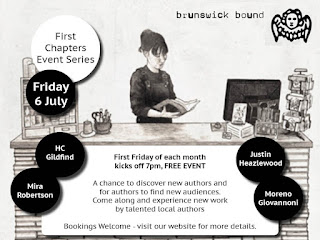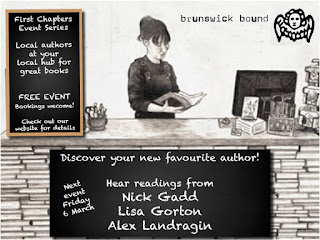First Chapters Q&A with Katherine Collette
Katherine Collette is a writer and environmental engineer.
Katherine will be reading at First Chapters on Friday 2 November from her debut novel The Helpline.
We asked Katherine a few questions about her writing and here is what she had to say.
1. Brunswick Bound has asked you to read a chapter from your published work. Tell us what we can expect from the chapter you have chosen?
You
will meet Germaine. Germaine is the main
character in The Helpline. She’s a woman who is very good with numbers
and not so good with people, as will become apparent.
2.
How would you describe the kind of books that you write?
Officially,
the term is ‘up lit’, i.e. uplifting literature.
I
write and, as a reader, seek positive stories because I think life is good. There’s
a lot that’s wrong with the world but there’s a lot that’s great about it
too.
To
be more specific, I like writing about people who are (overly) invested in
things that to an outsider seem small—the senior citizens club, the biscuit
barrel in the tearoom, the local council.
The sense of disproportionate-ness is funny to me, there’s a lot of
potential for humour in it.
3.
What was the first book that you read (or had read to
you) that left an impression on you?
When
I was really little I loved The GivingTree by Shel Silverstein. It was one
of the first books I got my own kids when they were born. My husband hadn’t read it until then and when
he did, he thought it was terrible. I’d always seen it as a book about a
beautiful, selfless love, but he thought it was more of an abusive relationship…
A controversy I know now existed when the book came out. While it’s tarnished
my view a little, I do still love the book.
And the fact that it has multiple and even contradictory interpretations,
is what I like about books full stop.
As
a writer, books that made a big impression were Penny Pollard’s Diary by Robin Klein and Secret Diary of Adrian Mole by Sue Townsend. I feel like there weren’t as many funny books
for kids when I was growing up and those two were exceptions. I think this has changed now.
I
think they can, but they don’t have to.
To
me, a good book can be read on multiple levels. It can be ‘just’ enjoyable, or you can engage
with it more deeply. I remember watching the cartoon of Animal Farm as a
kid. We had it on tape, I watched a lot
and it was great, even for a five year old.
You don’t have to know it’s about communism to get something out of
it. You might get more out of it if you
do, but it’s not the only way of reading it.
5.
What’s your go-to solution for writer’s block?
One
of the great things about having little kids and not much time to write is I
haven’t suffered from writers block.
Which is not to say everything I’ve ever written is great, but limitations
of time mean you don’t have the luxury of procrastination. If all you have is an hour a day, you just do
it.
That
said, if the writing is hard, swimming laps at the pool is the best for thinking/not
thinking.
6. What is your favourite word or phrase?
While
editing The Helpline I realised I had
multiple scenes in which one character would semi-aggressively squeeze another
character’s shoulder. Like a friendly pat that turns into an irritated crushing
action. I took out all but one. You can
only have one of the same joke or funny thing.
If you have more, it diminishes the joy and surprise of it. I always think the best, funniest lines are
the tiny ones you almost miss.
7.
What do you put down as your occupation when asked?
Engineer,
which is not completely random. In addition
to writing, I work as an engineer, planning where sewers go in areas that don’t
have them.
8.
What is the question that you hope never to be asked in an author Q&A?
Nothing
in particular, though sometimes a good question gets you thinking and you come up
with a better answer later. Which is how
it should be, I guess. You don’t want to
have all the answers straight off the bat.
9.
What question do you hope you will be asked and why?
I
don’t know what I’ve hoped for, but I’ve liked the questions I’ve had to think
about. Usually these are about the broader themes in the novel. What people see is not always what I thought
went in there. It’s allowed me to get a
better understanding of my views on things.
10.
Which book that you have read do you think should be better known or more
widely read?
Stasiland by Anna Funder, though it is
reasonably well known (in Australia anyway).
That book blew me away first time I read it. It’s one of my go-to gifts, actually, good
for readers/non-readers, Australians/people from overseas, women/men. I’ve bought dozens of copies of it.
Visit our website to find out more about the First Chapter event series.
Visit our website to find out more about the First Chapter event series.





Comments
Post a Comment